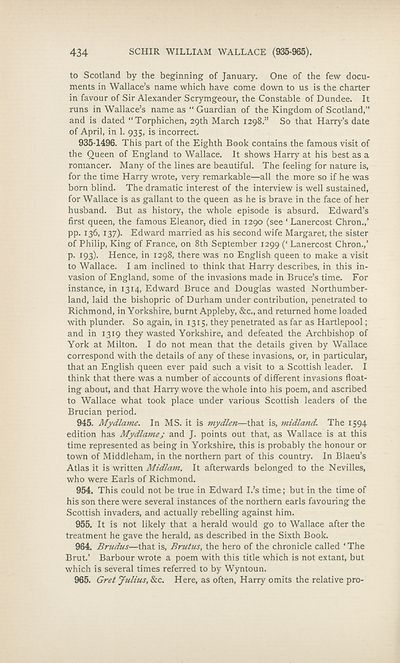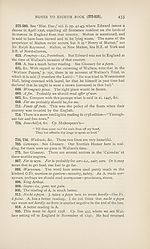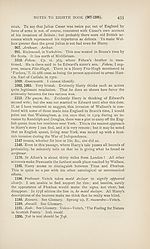Scottish Text Society publications > Old series > Actis and deidis of the illustere and vailzeand campioun, Schir William Wallace, Knicht of Ellerslie
(500) Page 434
Download files
Complete book:
Individual page:
Thumbnail gallery: Grid view | List view

434
SCHIR WILLIAM WALLACE (935-965).
to Scotland by the beginning of January. One of the few docu¬
ments in Wallace’s name which have come down to us is the charter
in favour of Sir Alexander Scrymgeour, the Constable of Dundee. It
runs in Wallace’s name as “ Guardian of the Kingdom of Scotland,”
and is dated “Torphichen, 29th March 1298.” So that Harry’s date
of April, in 1. 935, is incorrect.
935-1496. This part of the Eighth Book contains the famous visit of
the Queen of England to Wallace. It shows Harry at his best as a
romancer. Many of the lines are beautiful. The feeling for nature is,
for the time Harry wrote, very remarkable—all the more so if he was
born blind. The dramatic interest of the interview is well sustained,
for Wallace is as gallant to the queen as he is brave in the face of her
husband. But as history, the whole episode is absurd. Edward’s
first queen, the famous Eleanor, died in 1290 (see ‘ Lanercost Chron.,’
pp. 136, 137). Edward married as his second wife Margaret, the sister
of Philip, King of France, on 8th September 1299 (‘ Lanercost Chron.,’
p. 193). Hence, in 1298, there was no English queen to make a visit
to Wallace. I am inclined to think that Harry describes, in this in¬
vasion of England, some of the invasions made in Bruce’s time. For
instance, in 1314, Edward Bruce and Douglas wasted Northumber¬
land, laid the bishopric of Durham under contribution, penetrated to
Richmond, in Yorkshire, burnt Appleby, &c., and returned home loaded
with plunder. So again, in 1315, they penetrated as far as Hartlepool;
and in 1319 they wasted Yorkshire, and defeated the Archbishop of
York at Milton. I do not mean that the details given by Wallace
correspond with the details of any of these invasions, or, in particular,
that an English queen ever paid such a visit to a Scottish leader. I
think that there was a number of accounts of different invasions float¬
ing about, and that Harry wove the whole into his poem, and ascribed
to Wallace what took place under various Scottish leaders of the
Brucian period.
945. Mydlame. In MS. it is mydlen—that is, midland. The 1594
edition has Mydlamej and J. points out that, as Wallace is at this
time represented as being in Yorkshire, this is probably the honour or
town of Middleham, in the northern part of this country. In Blaeu’s
Atlas it is written Midlam. It afterwards belonged to the Nevilles,
who were Earls of Richmond.
954. This could not be true in Edward I.’s time; but in the time of
his son there were several instances of the northern earls favouring the
Scottish invaders, and actually rebelling against him.
955. It is not likely that a herald would go to Wallace after the
treatment he gave the herald, as described in the Sixth Book.
964. Brudus—that is, Brutus, the hero of the chronicle called ‘ The
Brut.’ Barbour wrote a poem with this title which is not extant, but
which is several times referred to by Wyntoun.
965. Gret Julius, &c. Here, as often, Harry omits the relative pro-
SCHIR WILLIAM WALLACE (935-965).
to Scotland by the beginning of January. One of the few docu¬
ments in Wallace’s name which have come down to us is the charter
in favour of Sir Alexander Scrymgeour, the Constable of Dundee. It
runs in Wallace’s name as “ Guardian of the Kingdom of Scotland,”
and is dated “Torphichen, 29th March 1298.” So that Harry’s date
of April, in 1. 935, is incorrect.
935-1496. This part of the Eighth Book contains the famous visit of
the Queen of England to Wallace. It shows Harry at his best as a
romancer. Many of the lines are beautiful. The feeling for nature is,
for the time Harry wrote, very remarkable—all the more so if he was
born blind. The dramatic interest of the interview is well sustained,
for Wallace is as gallant to the queen as he is brave in the face of her
husband. But as history, the whole episode is absurd. Edward’s
first queen, the famous Eleanor, died in 1290 (see ‘ Lanercost Chron.,’
pp. 136, 137). Edward married as his second wife Margaret, the sister
of Philip, King of France, on 8th September 1299 (‘ Lanercost Chron.,’
p. 193). Hence, in 1298, there was no English queen to make a visit
to Wallace. I am inclined to think that Harry describes, in this in¬
vasion of England, some of the invasions made in Bruce’s time. For
instance, in 1314, Edward Bruce and Douglas wasted Northumber¬
land, laid the bishopric of Durham under contribution, penetrated to
Richmond, in Yorkshire, burnt Appleby, &c., and returned home loaded
with plunder. So again, in 1315, they penetrated as far as Hartlepool;
and in 1319 they wasted Yorkshire, and defeated the Archbishop of
York at Milton. I do not mean that the details given by Wallace
correspond with the details of any of these invasions, or, in particular,
that an English queen ever paid such a visit to a Scottish leader. I
think that there was a number of accounts of different invasions float¬
ing about, and that Harry wove the whole into his poem, and ascribed
to Wallace what took place under various Scottish leaders of the
Brucian period.
945. Mydlame. In MS. it is mydlen—that is, midland. The 1594
edition has Mydlamej and J. points out that, as Wallace is at this
time represented as being in Yorkshire, this is probably the honour or
town of Middleham, in the northern part of this country. In Blaeu’s
Atlas it is written Midlam. It afterwards belonged to the Nevilles,
who were Earls of Richmond.
954. This could not be true in Edward I.’s time; but in the time of
his son there were several instances of the northern earls favouring the
Scottish invaders, and actually rebelling against him.
955. It is not likely that a herald would go to Wallace after the
treatment he gave the herald, as described in the Sixth Book.
964. Brudus—that is, Brutus, the hero of the chronicle called ‘ The
Brut.’ Barbour wrote a poem with this title which is not extant, but
which is several times referred to by Wyntoun.
965. Gret Julius, &c. Here, as often, Harry omits the relative pro-
Set display mode to: Large image | Zoom image | Transcription
Images and transcriptions on this page, including medium image downloads, may be used under the Creative Commons Attribution 4.0 International Licence unless otherwise stated. ![]()
| Permanent URL | https://digital.nls.uk/107006539 |
|---|
| Description | A collection of over 100 Scottish texts dating from around 1400 to 1700. Most titles are in Scots, and include editions of poetry, drama, and prose by major Scottish writers such as John Barbour, William Dunbar, Gavin Douglas, and George Buchanan. Edited by a key scholarly publisher of Scotland's literary history, and published from the late 19th century onwards by the Scottish Text Society. Available here are STS series 1-3. |
|---|

